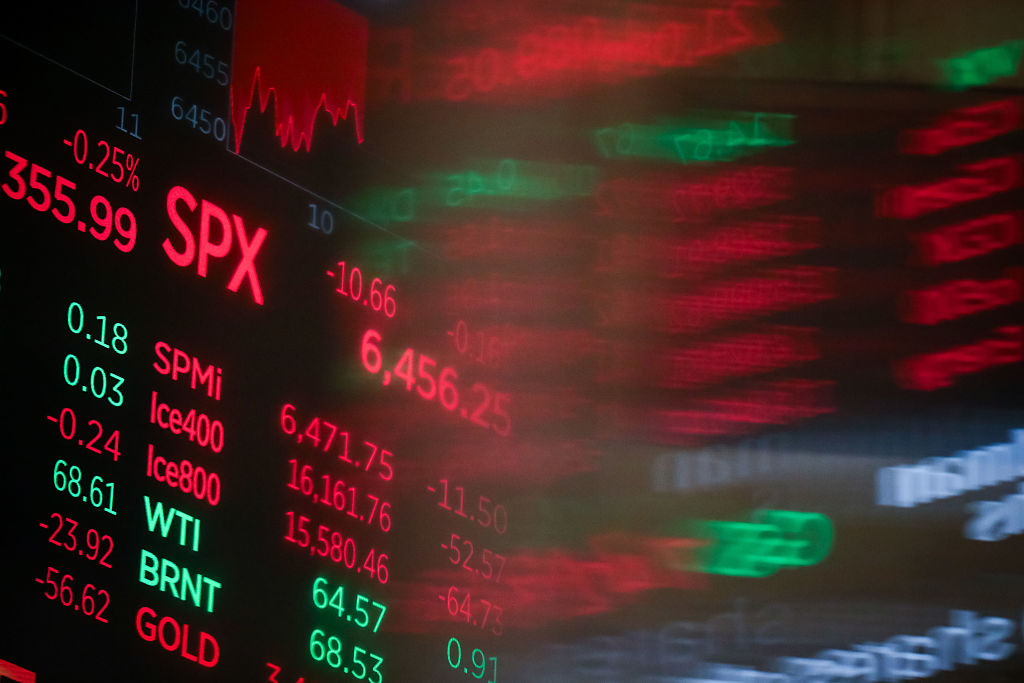Why You Should Invest In Healthcare Stocks
It stands to reason that investing in healthcare is less volatile than investing in other sectors. After all, people get sick in both good times and bad.


Profit and prosper with the best of Kiplinger's advice on investing, taxes, retirement, personal finance and much more. Delivered daily. Enter your email in the box and click Sign Me Up.
You are now subscribed
Your newsletter sign-up was successful
Want to add more newsletters?

Delivered daily
Kiplinger Today
Profit and prosper with the best of Kiplinger's advice on investing, taxes, retirement, personal finance and much more delivered daily. Smart money moves start here.

Sent five days a week
Kiplinger A Step Ahead
Get practical help to make better financial decisions in your everyday life, from spending to savings on top deals.

Delivered daily
Kiplinger Closing Bell
Get today's biggest financial and investing headlines delivered to your inbox every day the U.S. stock market is open.

Sent twice a week
Kiplinger Adviser Intel
Financial pros across the country share best practices and fresh tactics to preserve and grow your wealth.

Delivered weekly
Kiplinger Tax Tips
Trim your federal and state tax bills with practical tax-planning and tax-cutting strategies.

Sent twice a week
Kiplinger Retirement Tips
Your twice-a-week guide to planning and enjoying a financially secure and richly rewarding retirement

Sent bimonthly.
Kiplinger Adviser Angle
Insights for advisers, wealth managers and other financial professionals.

Sent twice a week
Kiplinger Investing Weekly
Your twice-a-week roundup of promising stocks, funds, companies and industries you should consider, ones you should avoid, and why.

Sent weekly for six weeks
Kiplinger Invest for Retirement
Your step-by-step six-part series on how to invest for retirement, from devising a successful strategy to exactly which investments to choose.
Healthcare stocks have had a rough few years. So why invest in them? First, I'm a contrarian. I like what's down. Second, healthcare is a booming industry, accounting for 18% of gross domestic product (GDP) in 2021, up from 12% in 1991. Third, the sector adds stability to any portfolio.
On this last point, consider the Health Care Select SPDR (XLV), an exchange-traded fund (ETF) linked to an S&P Global sector index. During the most recent bear market, for instance, when the S&P 500 dropped 25% between January and mid-October 2022, the healthcare ETF fell only 13%.
It stands to reason that healthcare is less volatile than other sectors. After all, in both good times and bad, people get sick and need the services of hospitals, pharmaceutical makers, drugstores, health insurers, medical device manufacturers and the whole apparatus of healthcare. In 2021 (the most recent year for statistics), the U.S. spent $4.3 trillion on healthcare. About one-third of that went to hospitals; one-fifth to doctors, nurses and clinical care; and one-tenth to pharmaceuticals.
From just $107.88 $24.99 for Kiplinger Personal Finance
Become a smarter, better informed investor. Subscribe from just $107.88 $24.99, plus get up to 4 Special Issues

Sign up for Kiplinger’s Free Newsletters
Profit and prosper with the best of expert advice on investing, taxes, retirement, personal finance and more - straight to your e-mail.
Profit and prosper with the best of expert advice - straight to your e-mail.
Four out of five hospitals are nonprofit, and opportunities for investing in physicians and their infrastructure are limited, so pharmaceutical companies tend to dominate healthcare mutual funds and ETFs.
That has been a problem. S&P's pharmaceutical index has lost an annual average of close to 2% over the past five years, compared with an annualized gain of 11% for the S&P 500 as a whole. Shares of Pfizer (PFE), maker of three of the expected top 10 medicines in 2023, have lost nearly 30% so far this year, compared with a gain of 19% for the S&P 500.
Drug stocks can carry regulatory risk
Investors are clearly nervous. Drug companies are unpopular with the public, and they have become a political target of both parties. Donald Trump issued an executive order to link the costs of our pharmaceuticals to lower ones in Europe, and under the Inflation Reduction Act of 2022, Congress launched a system of Medicare negotiations that will lead to price cuts for certain advanced medicines. Limits are also on tap in several states, including Colorado and Maryland.
Some drug stocks, including Pfizer and AbbVie (ABBV), look beckoningly cheap, but there is just too much regulatory risk. I would stay away from prescription pharmaceuticals.
As an alternative, look at stocks such as Kenvue (KVUE, $23), which Johnson & Johnson (JNJ) earlier this year spun off as a separate company. Kenvue has an impressive portfolio of over-the-counter medicines, such as Tylenol, Sudafed and Benadryl, plus other consumer brands (Band-Aid, Listerine and Neutrogena).
The stock has dropped since its spring debut and now trades at a reasonable price-earnings ratio of 18, based on a consensus of analysts' profit forecasts. The projected dividend yield is 3.5%. By the way, with the spinoff, J&J agreed to retain all liabilities related to lawsuits over its talcum powder and to indemnify Kenvue. (Stocks and funds I like are in bold; prices and returns are as of August 31.)
Another non-pharmaceutical choice is Stryker (SYK, $284), which makes knee and hip replacements – a growth industry as America gets older – as well as spinal implants for injuries and disease. With a P/E of 25, Stryker is not cheap, but profits have risen impressively and consistently.
As for hospitals, they have not been a good business in recent years as profitable surgical and diagnostic procedures (such as knee replacements and colonoscopies) have migrated to outpatient centers. But HCA Healthcare (HCA, $277) owns both traditional hospitals and freestanding surgical, urgent care and rehab facilities. HCA has also managed to keep costs under control at a time when shortages of nurses and other staff are pushing expenses up elsewhere. Shares have nearly doubled since late 2019, but the P/E is just 14.
Insurers, innovators are among the best healthcare stocks
Probably the best healthcare business is insurance, and the best company in that subsector is UnitedHealth Group (UNH, $477). Shares have doubled in the past four years, but the price is still attractive at a P/E of 17.
United also owns a pharmacy benefit manager called Optum Rx, which negotiates with drug companies on prices and takes a cut – an excellent business. I also like Cigna Group (CI, $275), which also owns a PBM and sells life insurance, too. It yields 1.8%, and its P/E is only 10.
My favorite mutual fund in the sector, the Fidelity Select Health Care Services (FSHCX), recently loaded up on Cigna stock, now its third-largest holding (UnitedHealth is first).
There's one more attractive category for health investors. Call it innovation. Consider Illumina (ILMN, $165), which provides tools that detect genetic variations. Its products are used by research institutes and companies that screen for cancer and other diseases. The stock became a darling of growth investors, rose too fast and lost roughly half its value in the first six months of last year. It's on the cutting edge of its field and attractive for risk-tolerant investors.
Also look at Danaher (DHR, $265), which began life making industrial products and has evolved into a diagnostics and research company that provides physicians and scientists with instruments, including microscopes and blood-analyzing tools.
Artificial intelligence has the potential to transform a sector that has been notoriously inefficient, but at this point, most AI-focused healthcare firms are still private. One that isn't is Augmedix (AUGX, $5), with a market capitalization (shares outstanding times price) of just over $200 million. The firm's software extracts data from conversations between physicians and patients and immediately turns it into medical notes. The notes are then transferred to the electronic record systems of healthcare providers, saving time and money. Augmedix, which went public in March 2021, is a risky stock with a big potential payoff but a potentially serious downside, too.
West Pharmaceutical Services (WST, $407) has been bucking the flat-to-downward trend in healthcare shares, its stock returning 73% since the start of 2023. West makes delivery systems for injectable drugs – a business segment that could see a boost from price controls, which can benefit drugs that are injected rather than swallowed. Also rising lately is Intuitive Surgical (ISRG, $313), whose robotics and other tools make surgeries less invasive.
Although I'm eschewing individual pharmaceutical stocks, I can enthusiastically recommend the Invesco S&P 500 Equal Weight Health Care (RSPH), an ETF with 65 holdings that are each weighted the same (about 1.6% when the fund is rebalanced each quarter) rather than by market cap, which would make the portfolio lopsided with big drugmaker stocks. Pharmaceuticals represent just 15% of assets; equipment and supplies, 29%. The fund's expense ratio is just 0.4%.
James K. Glassman chairs Glassman Advisory, a public-affairs consulting firm. He does not write about his clients. He owns none of the stocks listed here. You can contact him at JKGlassman@gmail.com.
Note: This item first appeared in Kiplinger's Personal Finance Magazine, a monthly, trustworthy source of advice and guidance. Subscribe to help you make more money and keep more of the money you make here.
Related content
Profit and prosper with the best of Kiplinger's advice on investing, taxes, retirement, personal finance and much more. Delivered daily. Enter your email in the box and click Sign Me Up.

-
 The New Reality for Entertainment
The New Reality for EntertainmentThe Kiplinger Letter The entertainment industry is shifting as movie and TV companies face fierce competition, fight for attention and cope with artificial intelligence.
-
 Stocks Sink With Alphabet, Bitcoin: Stock Market Today
Stocks Sink With Alphabet, Bitcoin: Stock Market TodayA dismal round of jobs data did little to lift sentiment on Thursday.
-
 Betting on Super Bowl 2026? New IRS Tax Changes Could Cost You
Betting on Super Bowl 2026? New IRS Tax Changes Could Cost YouTaxable Income When Super Bowl LX hype fades, some fans may be surprised to learn that sports betting tax rules have shifted.
-
 Dow Leads in Mixed Session on Amgen Earnings: Stock Market Today
Dow Leads in Mixed Session on Amgen Earnings: Stock Market TodayThe rest of Wall Street struggled as Advanced Micro Devices earnings caused a chip-stock sell-off.
-
 S&P 500 Tops 7,000, Fed Pauses Rate Cuts: Stock Market Today
S&P 500 Tops 7,000, Fed Pauses Rate Cuts: Stock Market TodayInvestors, traders and speculators will probably have to wait until after Jerome Powell steps down for the next Fed rate cut.
-
 S&P 500 Hits New High Before Big Tech Earnings, Fed: Stock Market Today
S&P 500 Hits New High Before Big Tech Earnings, Fed: Stock Market TodayThe tech-heavy Nasdaq also shone in Tuesday's session, while UnitedHealth dragged on the blue-chip Dow Jones Industrial Average.
-
 Dow Hits New High Then Falls 466 Points: Stock Market Today
Dow Hits New High Then Falls 466 Points: Stock Market TodayThe Nasdaq Composite, with a little help from tech's friends, rises to within 300 points of its own new all-time high.
-
 Stocks Struggle for Gains to Start 2026: Stock Market Today
Stocks Struggle for Gains to Start 2026: Stock Market TodayIt's not quite the end of the world as we know it, but Warren Buffett is no longer the CEO of Berkshire Hathaway.
-
 Stocks End Volatile Year on a Down Note: Stock Market Today
Stocks End Volatile Year on a Down Note: Stock Market TodayAfter nearing bear-market territory in the spring, the main market indexes closed out the year with impressive gains.
-
 Stocks Chop as the Unemployment Rate Jumps: Stock Market Today
Stocks Chop as the Unemployment Rate Jumps: Stock Market TodayNovember job growth was stronger than expected, but sharp losses in October and a rising unemployment rate are worrying market participants.
-
 AI Stocks Lead Nasdaq's 398-Point Nosedive: Stock Market Today
AI Stocks Lead Nasdaq's 398-Point Nosedive: Stock Market TodayThe major stock market indexes do not yet reflect the bullish tendencies of sector rotation and broadening participation.